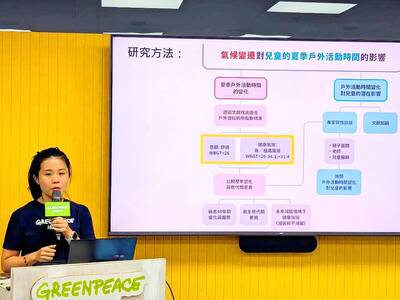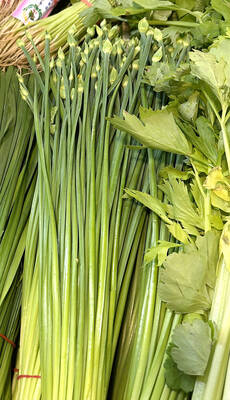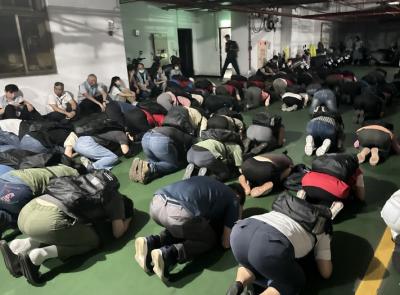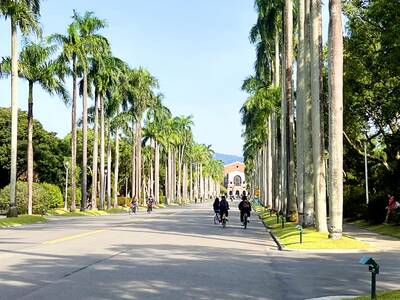Commenting on former Singaporean prime minister Lee Kuan Yew (李光耀), former president Lee Teng-hui (李登輝) said that his belief in democracy is at odds with the founding father of Singapore’s “Asian values,” which Lee Teng-hui described as having its roots in the Chinese dynastic system.
According to Lee Teng-hui, Lee Kuan Yew received great support from former president Chiang Ching-kuo (蔣經國), who allowed the Singaporean army to be dispatched to Taiwan for training.
However, Lee Teng-hui said that his and Lee Kuan Yew’s philosophies differed greatly, adding that he has faith in democracy and liberty, while Lee Kuan Yew’s “Asian values,” oversaw a political system in which “a whole family meddles in politics.”
“We were great friends and of similar ages, but to be honest, he depended on the Chinese [for support]. I do not feel like reliance on China is necessary, Taiwan should stand on its own two feet,” Lee Teng-hui said.
Taiwan struggled for 400 years to achieve self-governance, Lee Teng-hui said, adding that the hardship the nation edured was his motivation for taking good care of the country.
Many people survived Japanese colonial rule only to be governed by the Chinese Nationalist Party’s (KMT) regime, which treated Taiwanese as slaves, Lee Teng-hui said.
The most important attributes Taiwanese possess are freedom and democracy, values which set Taiwan apart from China, and definesa human being, he added.
Asked whether Lee Teng-hui would visit Singapore to pay tribute to his old friend Lee Kuan Yew, his office director Wang Yan-chun (王燕軍) said that the former president had sent his condolences via a telegram to the bereaved, after learning from the Ministry of Foreign Affairs that Lee Kuan Yew’s family have declined all offers of flowers.

The government should improve children’s outdoor spaces and accelerate carbon reduction programs, as the risk of heat-related injury due to high summer temperatures rises each year, Greenpeace told a news conference yesterday. Greenpeace examined summer temperatures in Taipei, New Taipei City, Taoyuan, Hsinchu City, Taichung, Tainan and Kaohsiung to determine the effects of high temperatures and climate change on children’s outdoor activities, citing data garnered by China Medical University, which defines a wet-bulb globe temperature (WBGT) of 29°C or higher as posing the risk of heat-related injury. According to the Central Weather Administration, WBGT, commonly referred to as the heat index, estimates

The Taipei Department of Health’s latest inspection of fresh fruit and vegetables sold in local markets revealed a 25 percent failure rate, with most contraventions involving excessive pesticide residues, while two durians were also found to contain heavy metal cadmium at levels exceeding safety limits. Health Food and Drug Division Director Lin Kuan-chen (林冠蓁) yesterday said the agency routinely conducts inspections of fresh produce sold at traditional markets, supermarkets, hypermarkets, retail outlets and restaurants, testing for pesticide residues and other harmful substances. In its most recent inspection, conducted in May, the department randomly collected 52 samples from various locations, with testing showing

Taipei and other northern cities are to host air-raid drills from 1:30pm to 2pm tomorrow as part of urban resilience drills held alongside the Han Kuang exercises, Taiwan’s largest annual military exercises. Taipei, New Taipei City, Keelung, Taoyuan, Yilan County, Hsinchu City and Hsinchu County are to hold the annual Wanan air defense exercise tomorrow, following similar drills held in central and southern Taiwan yesterday and today respectively. The Taipei Mass Rapid Transit (MRT) and Maokong Gondola are to run as usual, although stations and passenger parking lots would have an “entry only, no exit” policy once air raid sirens sound, Taipei

Taipei placed 14th in the Quacquarelli Symonds (QS) Best Student Cities 2026 list, its highest ever, according to results released yesterday. With an overall score of 89.1, the city climbed 12 places from the previous year, surpassing its previous best ranking of 17th in 2019. Taipei is “one of Asia’s leading higher-education hubs,” with strong employer activity scores and students “enjoying their experience of the city and often keen to stay after graduation,” a QS staff writer said. In addition to Taipei, Hsinchu (71st), Tainan (92nd), Taichung (113th) and Taoyuan (130th) also made QS’ list of the top 150 student cities. Hsinchu showed the